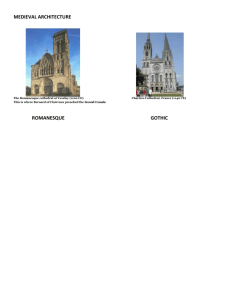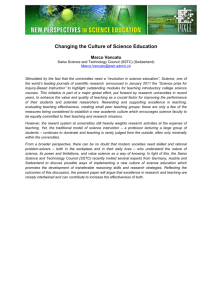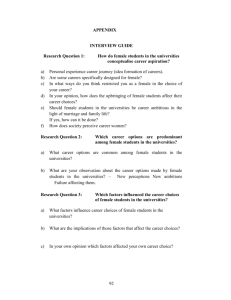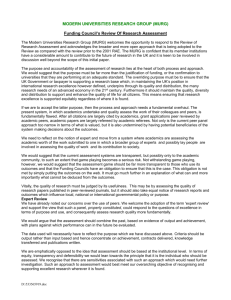What does the 'market' mean for the university?
advertisement
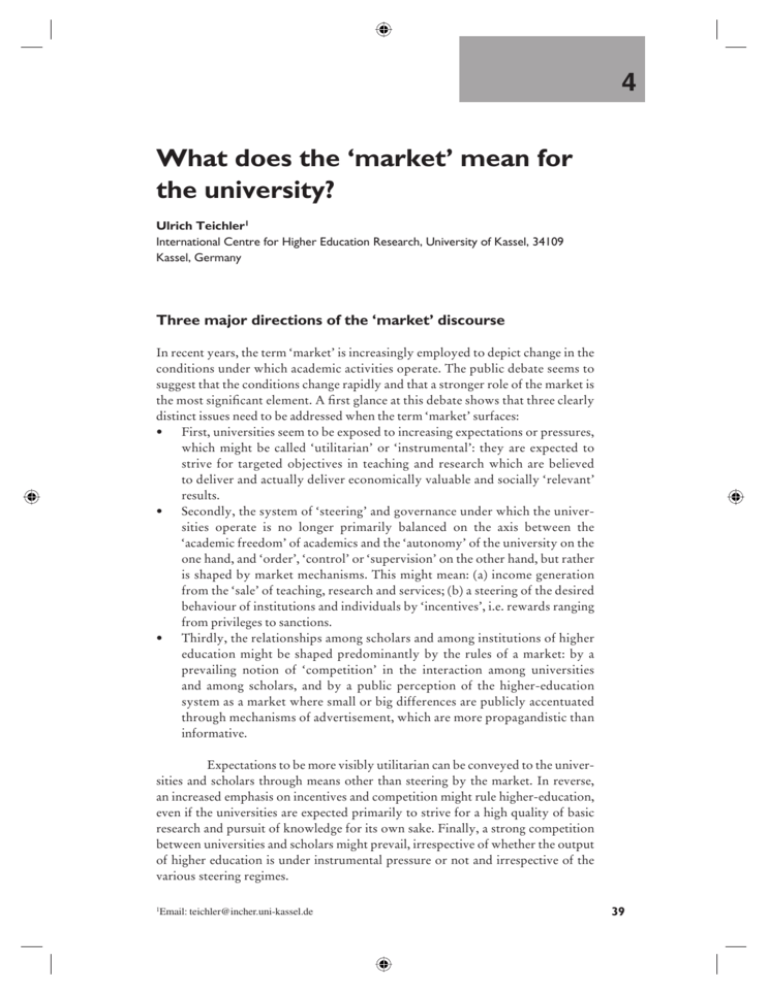
4 What does the ‘market’ mean for the university? Ulrich Teichler1 International Centre for Higher Education Research, University of Kassel, 34109 Kassel, Germany Three major directions of the ‘market’ discourse In recent years, the term ‘market’ is increasingly employed to depict change in the conditions under which academic activities operate. The public debate seems to suggest that the conditions change rapidly and that a stronger role of the market is the most significant element. A first glance at this debate shows that three clearly distinct issues need to be addressed when the term ‘market’ surfaces: • First, universities seem to be exposed to increasing expectations or pressures, which might be called ‘utilitarian’ or ‘instrumental’: they are expected to strive for targeted objectives in teaching and research which are believed to deliver and actually deliver economically valuable and socially ‘relevant’ results. • Secondly, the system of ‘steering’ and governance under which the universities operate is no longer primarily balanced on the axis between the ‘academic freedom’ of academics and the ‘autonomy’ of the university on the one hand, and ‘order’, ‘control’ or ‘supervision’ on the other hand, but rather is shaped by market mechanisms. This might mean: (a) income generation from the ‘sale’ of teaching, research and services; (b) a steering of the desired behaviour of institutions and individuals by ‘incentives’, i.e. rewards ranging from privileges to sanctions. • Thirdly, the relationships among scholars and among institutions of higher education might be shaped predominantly by the rules of a market: by a prevailing notion of ‘competition’ in the interaction among universities and among scholars, and by a public perception of the higher-education system as a market where small or big differences are publicly accentuated through mechanisms of advertisement, which are more propagandistic than informative. Expectations to be more visibly utilitarian can be conveyed to the universities and scholars through means other than steering by the market. In reverse, an increased emphasis on incentives and competition might rule higher-education, even if the universities are expected primarily to strive for a high quality of basic research and pursuit of knowledge for its own sake. Finally, a strong competition between universities and scholars might prevail, irrespective of whether the output of higher education is under instrumental pressure or not and irrespective of the various steering regimes. 1Email: teichler@incher.uni-kassel.de 39 40 U. Teichler Four causes Analyses aiming at identifying the causes for the increasing market discourse point at a broad range of factors. Four causes are most widely viewed as crucial: ‘knowledge society’, ‘expansion of higher education’, ‘loss of trust in the academic profession’ and ‘new public management’. • Knowledge society: ‘knowledge’ seems to have become increasingly important in most spheres of life, not only as a basis of production and services (‘knowledge economy’). As a consequence, society is willing to reserve more resources for the generation, dissemination and preservation of knowledge. But these additional resources are provided under the condition that the generation, dissemination and preservation of knowledge becomes more targeted, effective and efficient as far as ‘relevance’ and ‘utility’ are concerned. • Expansion of higher education: higher education has substantially expanded in recent decades. This is certainly a response to the emergence of a knowledge society, but other factors play a role as well; for example, an ‘opening up’ of higher education as an element of social justice, equality of opportunity, or an open society with a meritocratic scheme of selection and rewards. As a consequence of this expansion, higher education absorbs functions which were located outside higher education in the past, i.e. more practical training for middle-level occupations and the undertaking of ‘applied research’ and ‘development’. • Loss of trust in the academic profession: university professors continue to constitute a relatively prestigious occupation, but the more that higher education expands and the more that knowledge is viewed to be the basis of the knowledge society, the more professors lose their exclusive role and the more doubts which are raised in public as to whether academics can conduct their ‘business’ by themselves. Just as war seems to be too important to be left to the generals, the knowledge society seems to be too important to be left to the scholars. • New public management: within the government apparatus and within publicly run or publicly steered service sectors (utilities, education, health, welfare etc.), the traditional modes of legal target-setting and bureaucratic control have lost public trust. Instead, new modes of steering are called for; the most popular new version of steering is called ‘new public management’. We note clearer distinctions between decisions taken on a macro-societal level and responsibilities left to the individual institutions or to units within these institutions. Managerial power is increased. In higher education, the Dutch philosophy of ‘steering from a distance’ developed in the 1980s had the most profound influence on development in European countries: the government confines itself to selecting targets, gives up detailed process control and undertakes the establishment of an evaluation system which can serve for reflection and improvement within higher education institutions, as well as an instrument of output measurement which can serve as a basis for differential rewards. © The Authors. Volume compilation © 2008 Portland Press Ltd What does the ‘market’ mean for the university? One might argue, though, that these four changes of the context of higher education do not necessarily call for more market influence. Knowledge could be steered from government and other macro-societal actors, the power of the academic profession might be reduced in favour of other ‘visible hands’, i.e. the ‘stakeholders’, and the new steering mechanisms could rely more strongly on ‘evaluation’ and related strategic actions than on market mechanisms. Yet they are often referred to as triggers of increasing market elements in higher education. ‘Employability’: the utilitarian expectations with regards to teaching and learning Study at universities, traditionally, is not expected to be closely geared to professional preparation. At universities, understanding of the logic of the academic disciplines is often more strongly emphasized than its application to professional problem-solving. In this tradition, academic learning should go beyond the specialization of individual disciplines and occupational areas. Study is considered important for personal development and cultural enhancement. Study programmes should not be geared closely to the demands formulated on the part of the employment system, but rather should strive as well for ‘innovation’ and ‘critical thinking’. Where professional preparation plays a role, laying the foundation is traditionally viewed to be more desirable in many disciplines than targeted professional training. However, there were sectors of higher education which are traditionally more closely aligned to the world of work, such as traditional medicine and law, and later engineering, business studies and education. Moreover, most non-university higher education institutions in Europe aim to convey ‘applied knowledge’. In recent years, claims spread in Europe that curricula in higher education across more or less all fields and institutions should be more helpful for graduates in their future employment and work. The term ‘employability’ rapidly became a popular catchphrase in the United Kingdom and spread across European countries. Employability is a well established term in labour-market research and policy that addresses means to ensure that persons ‘at risk’, i.e. people almost not employable at all, can eventually be absorbed in one way or other by the employment system. As graduates from higher education are the most privileged group, the use of this term in the context of graduate employment is highly misleading. Instead, the debate could have more appropriately called for an increase in the ‘professional relevance’ of study. However, employability, as it is actually discussed in higher education in recent years, points at a broad range of often contradictory means which might help to make study a more targeted basis for professional success. These include: a higher degree of specialization, more emphasis on generic competences, work-based learning, practice-orientated or applied curricula, enhancement of key skills and personality, training for professional problem-solving, competence-orientated learning, support on the part of the university in the job search and placement process, etc. The broad range of © The Authors. Volume compilation © 2008 Portland Press Ltd 41 42 U. Teichler measures opted for in the name of enhancing employability shows that neither the individual measures taken nor their underlying aims are based on a broad consensus. But the success story of employability, with its varied interpretations, indicates the power of the expectation to which higher education is exposed to, that is, to make study more useful for the world of work. Mode 2, finalization and knowledge economy: the utilitarian expectations with regards to research It is clear that research in higher education is more strongly expected than ever to be visibly useful. Many advocates of highly instrumental research policies claim that “Humboldt is dead”, or should be. Thereby, the conception of the University of Berlin that emerged two centuries ago, with its profound world-wide impact, is often characterized as that of an ‘ivory tower’, in which scholars focused exclusively on the pursuit of knowledge for its own sake. Those depicting the past of the university in such a way call for research policies and strategies which have in mind the utility of eventual research findings for technological innovation, economic growth, societal well-being and cultural enhancement. We note an increase in research activities which are more strongly geared from the outset to expected outcomes. We observe increases in financial support for ‘strategic’, ‘applied’ and technology-driven research. And scholars are exposed to a growing influence of research policies at the European level, which are more targeted with respect to useful outcomes than national politics and call for an increase of research funding in order to make Europe “the most competitive economy of the world”. The concept of academic freedom formulated by Wilhelm von Humboldt, not a scholar defending the wishes of academia, but rather a key figure of the Prussian Ministry of Education, can also be regarded as strategic wisdom, directed at achieving useful and relevant knowledge: if academics are not guided and controlled by instrumental demands, but rather reflect and conduct research under conditions of academic freedom, they eventually might elicit more innovative results. On that basis, the question arises as to how much research should be free from specific pressures, as ‘basic research’ and as academically free research, in order to enhance the foundations of knowledge, without which no substantial progress could be expected in applied research and technology development. New steering devices and the market The second arena of debates and reforms linked to the market is that which is concerned with changing the system of steering and governance in higher education. Three directions of change, envisaged or realized, are crucial: • A realignment of power. Scholars face a loss of influence as far as opportunities of shaping the environment of their academic work are concerned. Instead, the university management becomes a key actor, and various external stakeholders are legitimized to have a formal say in university matters. © The Authors. Volume compilation © 2008 Portland Press Ltd What does the ‘market’ mean for the university? • • A move from input- and process-oriented towards output-oriented control: governments do not aim anymore, as in many countries in the past, to safeguard the quality, relevance and efficiency of higher education through strong involvement in target-setting, a quality guarantee via the provision of resources and detailed bureaucratic supervision. Rather, major evaluation systems are established which aim to measure the output and impact of the universities, whereby the information thus collected and the judgements elicited serve both as a feedback for improvement to the universities themselves and as a control device for the government and the public, which helps them to make funding and other strategic decisions. The relationships between government and the universities, as well as those between the university management and the academics, are no longer shaped primarily by clear institutional regulations of order, on the one hand, and by autonomy and academic freedom, on the other hand. Instead, an incentive system with rewards and sanctions is increasingly put in practice. These changes are often described in terms of the strengthening of market forces. Certainly, the universities become more akin to private enterprises. But one could argue that we do not note any weakening of visible hands. An environment of competition Academic environments traditionally were competitive, in the sense that striving for outstanding achievement was needed, and that only a small minority of those aimed to be academics as a lifetime career succeeded. This competition was limited in one respect; those academics achieving a senior academic position and lifetime employment who did not continue to strive for the highest academic quality were protected, and survived in the academic system as less ambitious and visible members. In recent years, evaluation mechanisms regularly assess the less ambitious and successful members of the academic world as well, and put more pressure on them. Major debates about an increasingly competitive environment, however, have focused in recent years on aggregates; the university as a whole or the department as a whole. The conditions for academic work for individual scholars or for individual teams are increasingly dependent on the average success of scholars within a larger unit. ‘Ranking systems’ rate universities or departments within individual disciplines country-wide, and international rankings of ‘world-class universities’ draw enormous public attention. The increasing emphasis placed on competition in general, and on the success of institutional aggregates, cannot be attributed to a single major cause. Many actors and experts believe that a concentration of top talents and resources at a few places in the higher education and research system is inevitable, because costly equipment cannot be provided everywhere and because a local cross-fertilization between top academics is hoped for. Moreover, it reflects the zeitgeist of a strong neo-liberal influence in all spheres of life that an increasing awareness of rivalry is likely to lead to the highest levels of productivity. This is considered so valuable that all intended and unintended negative effects of such a domination of © The Authors. Volume compilation © 2008 Portland Press Ltd 43 44 U. Teichler rivalry have be viewed as irrelevant or, at best, marginal. A good example of this is the call for heads of European states in the year 2000 to make Europe “the most competitive economy of the world”. Certainly one wants to be the most successful economy, but one talks about being the ‘most competitive’; thereby claiming competition as the one and only mechanism to achieve the greatest success. Concluding observations In describing recent trends and discourse in the higher education and research systems all over the world, market shows up frequently. One certainly could argue that there is inflationary use of the term. In summary, we do not observe a rapid move towards an academic market system in terms of strong rule by an ‘invisible hand’ or close attention to the expectations of the ‘consumers’. Rather, claims of a trend towards the market primarily consist of calls for instrumental knowledge generation and dissemination, an increasing role of incentive mechanisms and a climate in which a spirit of rivalry dictates the interaction between higher education institutions and scholars. The increasing ‘marketization’ of higher education and research pleases many politicians, employers and university managers. Also, a substantial proportion of academics see this with a favourable eye. Even if many of them are not faithful believers in a a social order predominantly shaped by the market being mirrored in a corresponding order of the academic system, marketization of higher education is often viewed as beneficial since: • It increases public and private financial support for higher education and research at a time when the public is concerned and excited about the knowledge society and the knowledge economy; and • It seems to have a mobilizing effect on higher education and research in general, thus enhancing overall quality and productivity. Yet the mainstream of academics does not seem to believe that the marketization of higher education and research is so beneficial that some risks and unintended consequences of this trend should be accepted as a more-or-less unavoidable by-product of the trend. At least four concerns and possible directions of redress are often voiced: • Over-instrumentalization, i.e. a concern that strategic research, applied research and development, as well as narrow concepts of employability in teaching and curriculum development will not leave enough room for basic research, pursuit of knowledge for its own sake, critical thinking and broad personality development, and thus will ultimately also undermine the quality of instrumental activities. • Over-narrowing of academic activities, i.e. concerns that those disciplines which promise to be useful knowledge to a lesser extent for a knowledge economy will shrink and suffer limited resources, as well as concerns that the diversity of concepts and methods within the individual disciplines will be lost. © The Authors. Volume compilation © 2008 Portland Press Ltd What does the ‘market’ mean for the university? • • Over-stratification of the higher-education system, i.e. concerns that so much effort will be placed on ‘elite universities’, ‘centres of excellence’ and world-class universities that ‘credentialism’ and ‘labelism’, rather than meritocracy, will be the rule of the game; unproductively high competition will undermine the overall quality; and sectors with important functions with be impoverished. Over-adaptation to the reward system, i.e. concerns that many academics allow themselves to be driven so strongly by extrinsic motivation that they strive for success according to the criteria of evaluation and indicators, rather than in terms of academic quality (for example, publishing in the right journal becomes more important than writing a high-quality article). Therefore, the search for appropriate balance will remain on the agenda. © The Authors. Volume compilation © 2008 Portland Press Ltd 45
